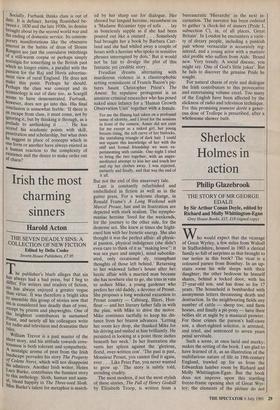Irish the most charming sinners
Harold Acton
THE SEVEN DEADLY SINS: A COLLECTION OF NEW FICTION Edited by Delia Cooke Severn House Publishers, £7.95
The publisher's blurb alleges that sin has always had a bad press, but I beg to differ. For writers and readers of fiction, in has always enjoyed a greater vogue than virtue. It was therefore a bright idea to assemble this group of stories now that sin is considered less deadly than of yore, except by priests and playwrights. One of the brightest contributors is surnamed Pnest, and nearly all his colleagues write for radio and television and dramatise their tales.
William Trevor is a past master of the Short story, and his attitude towards cove- tousness is both tolerant and sympathetic. A nostalgic aroma of peat from the Irish landscape pervades his story The Property of Colette Nervi, which will not disappoint his admirers. Another Irish writer, Helen Lucy Burke, contributes the funniest story to this anthology. Sloth, human and anim- al, blend happily in The Three-toed Sloth. Miss Burke's talent for metaphor is match- ed by her sharp ear for dialogue. Her shrewd but languid heroine, recumbent on a 'Madame Recamier type of sofa . . . lay as bonelessly supple as if she had been poured out like a custard . . . Somebody had brought her a book by Barbara Cort- land and she had whiled away a couple of hours with a heroine who spoke in sensitive phrases interrupted by dots.' But it would not be fair to divulge the plot of this fantastic yet credible story.
Freudian dreams alternating with murderous violence in a claustrophobic setting reminiscent of Francis Bacon's pic- tures haunt Christopher Priest's The Ament. Its repulsive protagonist is an amateur criminal researcher who has posed naked since infancy for a 'Human Growth Observation Unit' together with a female. For me the filming had taken on a profound sense of identity, and I lived for the sessions in front of the camera. Annie did not exist for me except as a naked girl, her young breasts rising, the soft curve of her buttocks, the tantalising triangle of dark hair. I could not equate this knowledge of her with the stiff and formal friendship we were ex- perimenting with outside. One night I tried to bring the two together, with an unpre- meditated attempt to kiss her and touch her and rip her clothes away. I was rejected, instantly and finally, and that was the end of it all.
But not the end of this unsavoury tale.
Lust is constantly refurbished and embellished in fiction as well as in the gutter press. For a welcome change, in Ronald Frame's A Long Weekend with Marcel Proust, lust and its frustration are depicted with stark realism. The nympho- maniac heroine 'lived for the weekends, for the journey to the other side, for the demonic sex. She knew at times she fright- ened him with her frenetic energy. She also thought it was the perfect affair: all physic- al passion, physical indulgence (she didn't even care to think of it as "making love": it was sex pure and simple), mind subordin- ated, only occasional sly, triumphant thoughts of those left behind.' Returning to her widowed father's house after her hectic affair with a married man because she has nowhere else to go, she tries in vain to seduce Mike, a young gardener who prefers her old daddy, a devotee of Proust. She proposes a long weekend excursion to Proust country — Cabourg, Illiers, Hon- fleur — and her literary father falls in with the plan, with Mike to drive the motor. Mike continues tactfully to keep his dis- tance from her brazen advances. 'Letting her room key drop, she thanked Mike for his driving and smiled at him brilliantly. He persisted in looking at a point three inches beneath her neck.' In her frustration she vents her spleen against the 'glorious, florid, over-written con'. 'The past is past, Monsieur Proust, you cannot find it again, ever. . . Like Peter Pan, you never wanted to grow up.' The story is subtly told, avoiding crudity. The most modern, if not the most stylish of these stories, The Fall of Henry Godsill by Elizabeth Troop, is written from a bureaucratic 'Hierarchy' in the next in- carnation. The narrator has been ordered to gather 'a check-list of sinners (Pride I, subsection C), in, of all places, Great Britain'. In London he encounters a varie- ty of dreary people, including a punkish pair whose vernacular is accurately reg- istered, and a young actor with a matinee idol profile who suffers from Aids: 'Brand new. Very trendy. A social disease, you might say. One of God's little jokes'. But he fails to discover the genuine Pride he sought.
For natural charm of style and dialogue the Irish contributors to this provocative and entertaining volume excel. Too many of the English have been affected by the slickness of radio and television technique. For this promising jeunesse dor& a gener- ous dose of Trollope is prescribed, after a wholesome shower bath.


















































 Previous page
Previous page